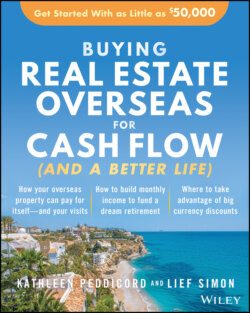Читать книгу Buying Real Estate Overseas For Cash Flow (And A Better Life) - Kathleen Peddicord - Страница 45
Nondollar Cash Flow Can Fund Local Adventures
ОглавлениеThe third difference between buying real estate for cash flow in the United States and buying real estate for cash flow overseas is that often the cash flows in a different currency. Like OPM, this is a potential upside and also a potential risk.
In 2015, we went shopping for a rental apartment on Portugal's Algarve coast. After eight years of economic crisis, this country was at a bottom and we perceived turning the corner. After exploring several beach towns and villages, we focused on Lagos, where we toured six properties and liked one in particular for its location, undervalued price, and motivated seller. Our math, based on data from the real estate agent and our own market research, projected a net annual return of 8%. Our general net yield expectation from a rental anywhere is 5% to 8%. We made an offer and proceeded with the purchase.
Other apartments we looked at in Lagos projected as good or better net rental yields and came with similarly appealing price tags. We chose the apartment we did because we agreed we would be happy owning it even if it didn't rent well or at all. When you're buying, rental projections are just that. You don't know what your yield will be until you begin earning it.
The apartment we bought was in the center of the town, on a winding, cobblestoned, pedestrian-only street, with easy access to shops and restaurants, and it had a rooftop terrace with an ocean view. We could use the place for personal vacations, we told ourselves as we stood on the roof looking out at the sea, in addition to or even instead of renting it out. And we did. During the four years we owned the property, we visited four times. During those stays, we withdrew some of the euro cash accumulated from apartment rent paid into our Portugal bank account and used that money to cover our expenses. It was like a series of free holidays in a fifteenth-century town on Europe's sunny southern coast. In addition to vacation mad money, the rental cash flow covered all expenses associated with the apartment and left us with a nice-sized and steadily growing euro nest egg.
The rental return met our 8% projection the first year and hit our 5% to 8% mark each of the four years we owned it, based on the original purchase price. The problem, if you want to call it that, was that markets across Portugal, including in Lagos, appreciated quickly after this country turned its crisis corner. During a visit to Lagos four years after our purchase, a friend in the local real estate industry suggested we think about selling our apartment.
“I'm certain you could get more than twice what you paid,” he told us.
We didn't believe him, but two other local agents concurred. Calculated on the much higher valuation, our net rental return was less than 3%. At that yield, we're sellers rather than buyers.
All real estate in the Algarve appreciated over the four years we owned our Lagos apartment, but our apartment more than doubled in value. Part of the reason was the location and the type of property. It worked as a rental, but it was also comfortable for full-time living. In addition, the place had a charm factor that set it apart. It wasn't one of the cookie-cutter beach-resort condos you find along this coast. That je ne sais quoi element was part of the reason we bought in the first place. It's not a data point you can enter into your spreadsheet when shopping, but it is something to remember when comparing properties for potential purchase. Building a portfolio of cash-flowing properties overseas is a chance to make money and build wealth, yes, but it's also a chance to improve your lifestyle. Remember that—sometimes even prioritize that—when making investment choices.
The exchange rate between the euro and the U.S. dollar didn't move much over the four years we owned the property in Portugal, but it could have. This is another reason it's better to buy in places where you want not only to make money but also to spend time. We were happy to spend the euros we were earning locally, meaning we were insulated against potential currency downside. It didn't matter to us if the euro lost ground on the dollar, because we weren't converting our euros into dollars. We were spending and accumulating them in euroland.
Likewise, when we sold that apartment, we kept the proceeds in euros, ready for a next EU investment.
